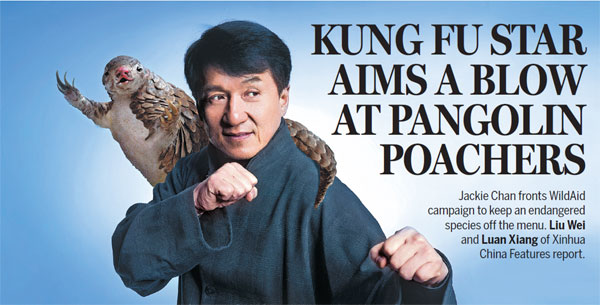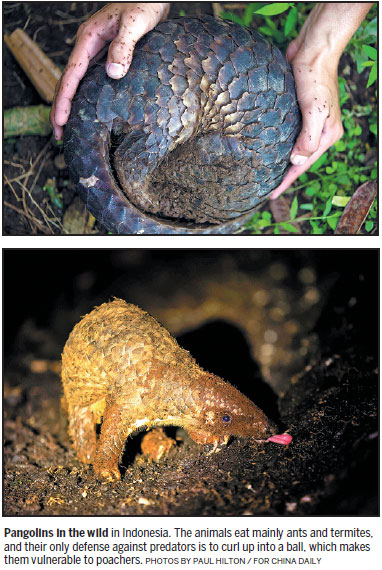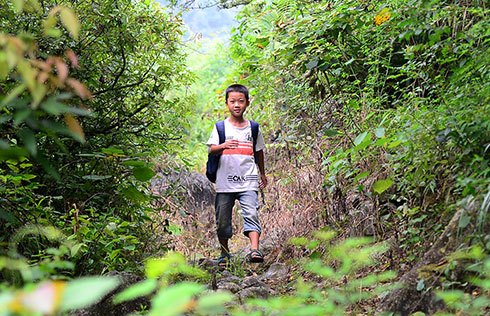Kung fu star aims a blow at pangolin poachers
Jackie Chan fronts WildAid campaign to keep an endangered species off the menu. Liu Wei and Luan Xiang of Xinhua China Features report.
One of the world's oldest species of mammal is facing the threat of extinction, but just one small word might save it - "No."
That's the message from movie star Jackie Chan in the latest Wild-Aid campaign video designed to stop people eating or buying pangolin products.
Coming hot on the heels of similar campaigns against the consumption of shark fin, bear bile or tiger bones fueled by antiquated superstitions, the action hero appeared across China last month to raise awareness on the need to protect this endangered species.
In the video, he tries to teach a group of pangolins some martial arts moves, only to find that the toothless, timid animals only know how to curl up into a ball, making themselves vulnerable to poachers.
"The pangolins cannot defend themselves. It is up to us to take action to save them," Chan says.
The video was jointly produced by WildAid, the Nature Conservancy and the China Wildlife Protection Association, and is being broadcast at home and abroad via the China News Network.
Chan says in the video he hopes more people, especially children, will learn about these helpless animals and join the mission to save them.
"When I was a young boy, I practiced kung fu and got injured often," he says. "I was told then that using medicine made of tiger bones would cure me. Only when I grew up did I realize that it was all a lie.
"We should teach our children not to eat, use or buy pangolin products from an early age. Hopefully, future generations will have the chance to coexist with pangolins."
The action star, who is a wildlife protection ambassador, later told Xinhua News Agency that his next movie will focus on fighting wildlife trafficking, and he will almost certainly include pangolin protection in the story.
Is it too late?
Pangolins represent 70 million years of unique evolution.
These quiet, solitary, nocturnal creatures feed on ants and termites. Their bodies are covered by an armor of large keratin scales, which, according to an old wives' tale, can help new mothers produce breast milk or alleviate asthma. The animal's meat is also often consumed in Asia as a delicacy.
Although research has proved pangolin scales are no different to human fingernails in composition and their meat is considered unsafe because it eludes quality inspections, these animals have been slaughtered to near extinction in Asia and Africa.
Their natural habitats have also been seriously reduced by deforestation.
One pangolin produces a litter of one to three offspring, which are nurtured for about two years. The low breeding rate stands in stark contrast to the enormous quantities seized for international smuggling, and the animal is listed as one of the world's most trafficked mammals by the World Wildlife Fund.
It is estimated that 100,000 pangolins are captured every year in Africa and Asia. As a result, all eight species of pangolin feature on the International Union for the Conservation of Nature's "red list" of animals threatened with extinction. Four Asian species are classified as critically endangered, while four African species are classified as vulnerable.
According to the Convention on International Trade in Endangered Species of Wild Flora and Fauna, commonly known as CITES, the number of pangolins in China has fallen by 90 percent over the past 21 years. It is estimated the country may have significantly fewer pangolins than giant pandas.
In the past decade, over 1 million pangolins were illegally trafficked worldwide, according to estimates by the International Union for the Conservation of Nature.























